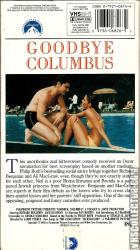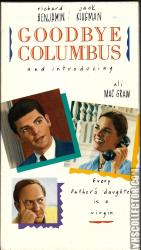Goodbye, Columbus
Catalog Number
6826
-
Primary Distributor (If not listed, select "OTHER")
Catalog Number
6826
Primary Distributor (If not listed, select "OTHER")
Release Year
Country
N/A (NTSC)
N/A | N/A | N/A
N/A | N/A
Goodbye, Columbus (1969)
Additional Information
Additional Information
Based on one of author Phillip Roth's shorter works, Goodbye Columbus stars Richard Benjamin as Neil, a young man of humble means who falls in love with Jewish-American-princess Brenda (Ali MacGraw). Their romance is out of the question so far as Brenda's suburbanite parents are concerned, so Neil and Brenda rendezvous in some of the sleaziest motels ever seen in a 1960s film (and that assessment includes The Bates Motel). Unwilling to take birth control pills because they upset her tummy, Brenda opts for a diaphragm, which unfortunately is discovered by her mother. Their rocky relationship comprises the bulk of the film. The trendy, New Wave-influenced direction by Larry Peerce gained a great deal of critical attention in 1969, notably such self-indulgent devices as having a close-up of a girl's navel dissolve into a long-shot of a swimming pool. Far more memorable is Peerce's amusingly straight-on depictions of upper-class Jewish/American social functions. In their film debuts, Richard Benjamin and Ali MacGraw are appealingly awkward; the more memorable performance is delivered by Michael Meyers as MacGraw's adenoidal younger brother
When the film was first released Variety magazine lauded the film, writing, "This adaptation of Philip Roth's National Book Award-winning novella is sometimes a joy in striking a boisterous mood, and otherwise handling action. Castwise the feature excels. Richard Benjamin as the boy, a librarian after serving in the army, and Ali MacGraw, making her screen bow as the daughter of wealthy and socially-conscious parents, offer fresh portrayals seasoned with rich humor. Their romance develops swiftly after their meeting at a country-club pool."[5]
The New York Times film critic, Vincent Canby, liked the film but was annoyed that it strayed from Roth's original work, "Thus, at its center, Goodbye, Columbus is sharp and honest. However, the further they are removed from the main situation, the more the subsidiary characters, lightly sketched in the novella, become overstuffed, blintz-shaped caricatures. Jack Klugman and Nan Martin, as Brenda's parents, are very nice, but Michael Meyers, as her huge, empty-headed brother ('so exceedingly polite,' Mr. Roth observed in the novella, 'that it seemed to be some affliction of those over six foot three') borders on a cartoon figure. Also, I somehow resent the really vulgar manners that Mr. Peerce allows his middle-class Jews—especially at an elaborate wedding reception—not because of any particular bias, but because it is gross moviemaking. These reservations, however, become academic. Goodbye, Columbus is so rich with understanding in more important ways that it is a thing of real and unusual pleasure.[6]
More recently film critic Dennis Schwartz has praised the film as well, writing, "Philip Roth's prize-winning novella, a scathing satire of a nouveau riche Jewish family, has been brilliantly adapted for the screen by Arnold Schulman (received an Academy nomination) and directed by Larry Peerce (his father is the great opera singer Jan Peerce). Somehow it slipped under the radar and as far as I'm concerned is both funnier and more perceptive than even The Graduate, an earlier drama about young adult
Boxoffice: $22,000,00 2013: $155,219,000
When the film was first released Variety magazine lauded the film, writing, "This adaptation of Philip Roth's National Book Award-winning novella is sometimes a joy in striking a boisterous mood, and otherwise handling action. Castwise the feature excels. Richard Benjamin as the boy, a librarian after serving in the army, and Ali MacGraw, making her screen bow as the daughter of wealthy and socially-conscious parents, offer fresh portrayals seasoned with rich humor. Their romance develops swiftly after their meeting at a country-club pool."[5]
The New York Times film critic, Vincent Canby, liked the film but was annoyed that it strayed from Roth's original work, "Thus, at its center, Goodbye, Columbus is sharp and honest. However, the further they are removed from the main situation, the more the subsidiary characters, lightly sketched in the novella, become overstuffed, blintz-shaped caricatures. Jack Klugman and Nan Martin, as Brenda's parents, are very nice, but Michael Meyers, as her huge, empty-headed brother ('so exceedingly polite,' Mr. Roth observed in the novella, 'that it seemed to be some affliction of those over six foot three') borders on a cartoon figure. Also, I somehow resent the really vulgar manners that Mr. Peerce allows his middle-class Jews—especially at an elaborate wedding reception—not because of any particular bias, but because it is gross moviemaking. These reservations, however, become academic. Goodbye, Columbus is so rich with understanding in more important ways that it is a thing of real and unusual pleasure.[6]
More recently film critic Dennis Schwartz has praised the film as well, writing, "Philip Roth's prize-winning novella, a scathing satire of a nouveau riche Jewish family, has been brilliantly adapted for the screen by Arnold Schulman (received an Academy nomination) and directed by Larry Peerce (his father is the great opera singer Jan Peerce). Somehow it slipped under the radar and as far as I'm concerned is both funnier and more perceptive than even The Graduate, an earlier drama about young adult
Boxoffice: $22,000,00 2013: $155,219,000
Related Releases1
Catalog Number
6826
Primary Distributor (If not listed, select "OTHER")
Goodbye, Columbus (1969)
Release Year
Catalog Number
6826
Primary Distributor (If not listed, select "OTHER")
Catalog Number
6826










Comments0
Login / Register to post comments